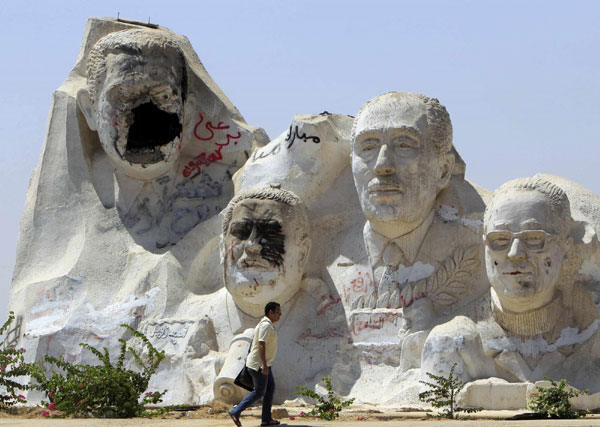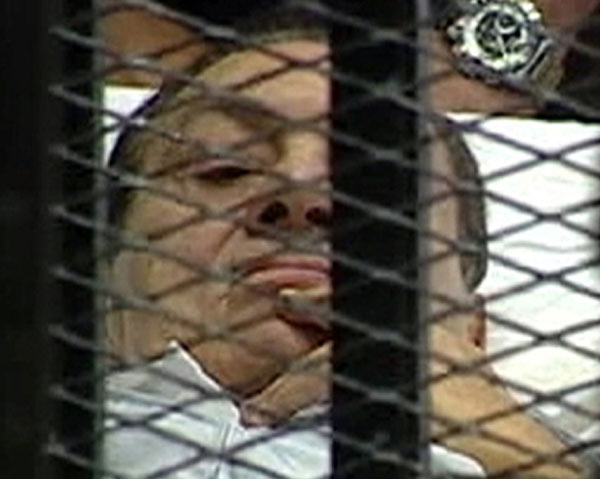Mubarak wheeled into court in bed for trial
Updated: 2011-08-03 15:07
(Agencies)
|
|||||||||||

An Egyptian man walks past a defaced giant statue of former Egyptian President Hosni Mubarak (L) on the outskirts of Cairo August 2, 2011, a day before his trial.[Photo/Agencies] |
|
 Former Egyptian President Hosni Mubarak is seen in the courtroom for his trial at the Police Academy in Cairo in this still image taken from video August 3, 2011. [Photo/Agencies] |
CAIRO - Egypt's ousted President Hosni Mubarak, on trial for conspiring to kill protesters, was wheeled into a courtroom cage in a hospital bed on Wednesday -- an image that sends a chilling message to other Arab autocrats facing popular uprisings.
Judge Ahmed Refaat called for quiet when he entered the court to start the trial at Cairo's police academy. Mubarak's two sons, Alaa and Gamal, also on trial, were dressed in the white outfits of defendants.
Ahmed Farghali, among protesters who had gathered outside the hospital in Sharm el-Sheikh from where Mubarak was flown to Cairo, said he could not believe he would see the president locked in a cage. "It was beyond my wildest dreams," he said.
Speculation had swirled in the hours before the trial about whether the frail 83-year-old, hospitalised in the Red Sea resort Sea since April, would turn up in the Cairo court.
Mubarak's trial is unprecedented. He was driven from office by his people and they are holding him to account in a way that will send a stark message to other Arab rulers facing unrest.
Tunisian President Zine al-Abidine Ben Ali, the first Arab leader to be ousted in the Arab Spring, was tried and sentenced to jail in absentia. He fled to Saudi Arabia. Iraq's Saddam Hussein was ousted by US-led forces, then tried and hanged.
Wednesday's court session may be over quickly with charges read and pleas recorded. Legal experts say comments by Judge Refaat before the trial suggested there might be daily sessions after this to ensure a swift verdict.
Police patrolled the street near Mubarak's hospital and barred the way to a small group of protesters outside, chanting: "The people want the execution of the killer."
Outside the court site on the outskirts of Cairo, a screen was erected to show the trial. Pro- and anti-Mubarak protesters faced off. Some in the two groups hurled stones at each other. Hundreds of police outside intervened to calm them down.
A small pro-Mubarak rally of men, women and children chanted: "Oh Mubarak hold your head high" and "We will demolish the prison and burn it down, if Hosni Mubarak is sentenced." Nearby another group against Mubarak chanted: "Raise your voice, Freedom will not die."
Mubarak was on trial with his two sons Gamal, a banker-turned-politician once seen as being groomed for the top office, and Alaa, who had business interests, as well as former Interior Minister Habib al-Adli and six senior officers.
A business executive and Mubarak confidant, Hussein Salem, is being tried in absentia.
Charges range from conspiring in the killing of protesters to abusing power to amass wealth.
Security was tightened in Cairo's Tahrir Square. Police and military officers in riot gear were deployed there, with dozens of police trucks and a few army armoured personnel vehicles.
Protesters had camped out in Tahrir for three weeks in July seeking a swifter trial for Mubarak and other reforms. They feared the ruling generals would use Mubarak's illness as a ploy to avoid publicly humiliating the war veteran and ex-president who ran Egypt for 30 years until February 11.
If convicted, Mubarak could face the death penalty. In his only public comments since quitting, he vowed in April to clear his name and that of his family of accusations of corruption.
"If you feel sympathy for any dictator broken and standing in a cage, remember him when he was unjust on the throne," Marian wrote on Twitter, using the website that became a tool in rallying the masses during the 18-day uprising against him.
CAGE IN POLICE ACADEMY
The big metal cage stands in a hall that can seat hundreds of people in the Police Academy, the same location where two days before protests erupted on January 25 Mubarak had praised the work of the police in keeping Egypt secure.
Police used live ammunition, rubber bullets and teargas on protesters in Cairo and other cities. In Suez, an effigy of Mubarak hangs from a lamppost near the police station that was gutted by fire during street battles that raged there.
Egyptians blame Mubarak for economic policies they say filled the pockets of the rich while many of the nation's 80 million people scrabbled in squalor to feed their families. They are also angry at his repression of any opposition.
Yet some are reluctant to see a man who was a bomber pilot and then leader of the air force in the 1973 war with Israel put in the dock. Others are simply tired of the disruption protests have cause and want to return to their daily lives.
Activist and director Mohamed Diab wrote on Twitter that the trial was "likely to cause a big rift, just like after his second speech. Imagine Mubarak with white hair, weeping and collapsing in court".
Mubarak, who dyed his hair as he aged in office, had won over some Egyptians with his final speeches that focused on what he described as a lifetime of service. Others were angered by what they saw as his paternalistic and patronising style.
When the army finally stepped in to take control and he was flown off to internal exile in Sharm el-Sheikh, the streets of the capital and other cities erupted into cheers.